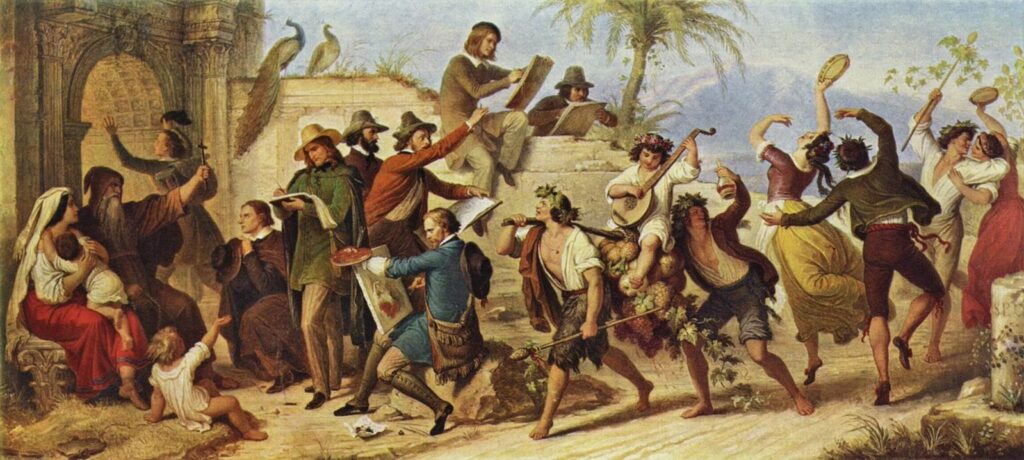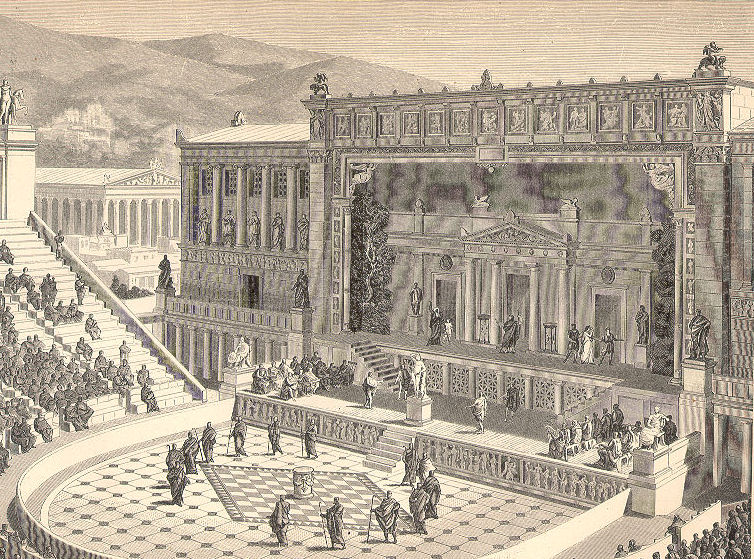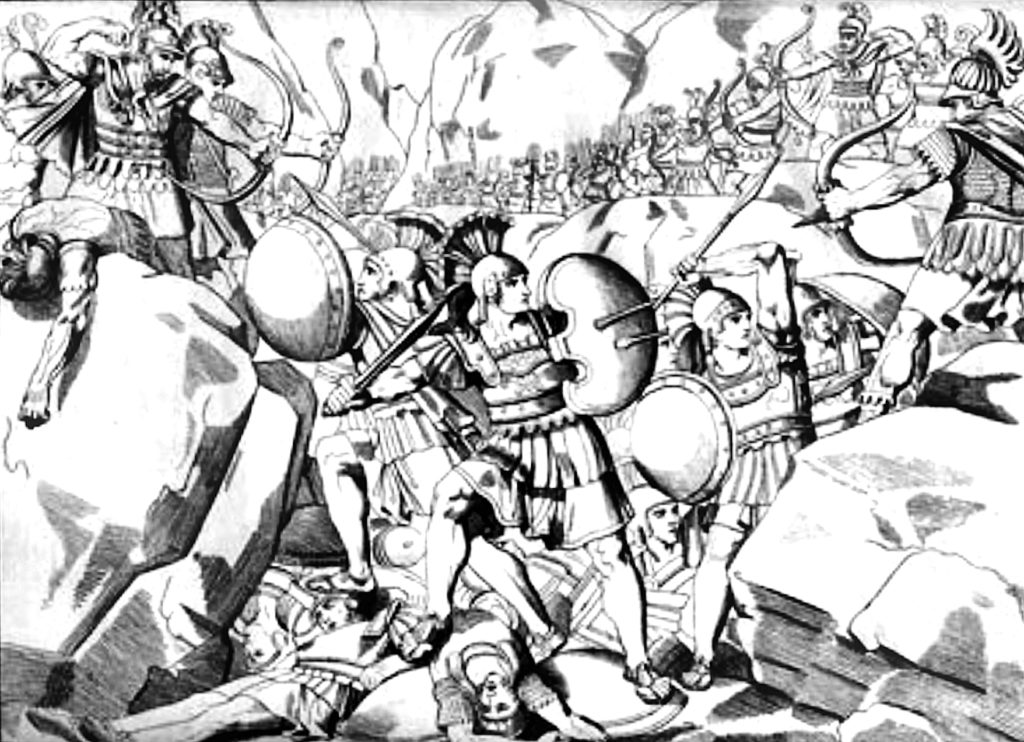The world of Ancient Greece was steeped in religious and cultural traditions of all kinds. Festivals and rituals played a central role in everyday life. The Great Dionysia was one such festival.
In ancient Athens, the celebration was a time of revelry, theater, and religious devotion. For several days each spring, the city would come alive with processions, sacrifices, and dramatic performances in honor of the god, Dionysus.
The festival was a celebration of all things Dionysian. It was a time to embrace the wild, fun, and ecstatic aspects of life. From competitive dramas performed by famous playwrights to the raucous parades through the streets, the Great Dionysia was a spectacle unlike any other.
Through the festival, the people of Athens sought to appease their god and affirm their collective, civic identity as a proud, magnificent city devoted to both the arts and the divine.

The Great Dionysia in Greek History
The origin of the Great Dionysia festival has its roots in the more rural areas of Attica. This was an area on the outskirts of the city of Athens – the rural Dionysia.
It’s uncertain how far back it dates, but it is quite likely that the very ancient festival traces to centuries before its first manifestation in Athens.
In the city, the festival – also called the City Dionysia – was first held in the 6th century BC, under the tyranny of Peisistratus. Each March, the festivities were held throughout Athens in honor of Dionysus, the god of wine, fertility, and theater, lasting about a week.
The festival fell under the sponsorship and control of the Archons of Athens. These figureheads were much like city councilors or magistrates. This is opposed to the powerful basileus, to whom religious festivals were typically given after the 7th century BC.
Impressively, the Great Dionysia likely continued to be held annually for centuries, all the way up until the end of the Hellenistic period and the fall of Ancient Greece to the Roman Republic.
Honoring Dionysus
Dionysus was an important god in ancient Greek religion and mythology. He was associated with wine, fertility, and madness, among other things.
The worship of Dionysus was firmly established by the seventh century BC, although it may have been practiced even earlier by Mycenaean Greeks. Traces of Dionysian-like cults have even been found in ancient Minoan Crete.
Greeks worshiped him through a variety of festivals, including the Anthesteria. This also included processions and dramatic performances.
It was believed that wine had the power to alleviate suffering, bring about happiness, and induce divine frenzy. So while these festivals were meant to celebrate the god, they were also meant to free the people from fear and anxiety and let them release any pent-up energy and emotions.
Days of Theatrical Performances
The hallmark of the Great Dionysia was its theatrical performances.
From the start, the festivals of Dionysus heavily featured the enactment of his myths through dramas. Some say they were responsible for the emergence of theater in Western civilization.
The festival lasted several days. It began with three full days of tragic plays performed by three different playwrights. Each one was responsible for putting together three tragedies and one satyr play.
Following the heavy and emotional tragedies, a day of five comedic plays was presented to provide a much-needed break. However, comedy wasn’t always a part of the performances – it wasn’t introduced until 486 BC.

The Theatre of Dionysus was the primary venue for these performances. Most of the extant Greek tragedies were performed there.
The magnitude of the crowds was impressive. Each year, up to 16,000 Athenian citizens – men and women of all ages – would crowd into the theater to watch the new sagas and stories composed by renowned Greek playwrights.
The Competition
Viewers included more than just excited and drunk citizenry. The dramatic performances were also part of a grand competition.
Performances during the festival were highly competitive. Playwrights and actors competed for recognition and prizes. Winning was considered a great honor.
Until 449 BC, only dramatic works and tragic poets were awarded prizes. But after that time, actors also became eligible for recognition of their own.
Despite the discontinuation of new comedy and tragedy plays in the 2nd century BC, drama continued to be produced. However, prizes shifted towards wealthy producers and renowned actors.
Judges were chosen by lot and winning was highly coveted. On the seventh and final day of the festival, the judges would select winners of the tragedy and comedy performances. Another procession and celebration would then take place.
Popular playwrights such as Aeschylus, Sophocles, and Euripides were often in the running for the top prize. The victorious playwrights were then presented with a wreath made of ivy as a symbol of their achievement.
Processions, Festivities, and More
The Great Dionysia also involved elaborate processions and celebrations that marked the arrival of the sacred statue of Dionysus at the theater.
The festivities included singing chants, carrying giant, phallic figurines, and excessive consumption of wine. It truly would have been a sight to behold.
Each day began with a parade or procession. War orphans would be honored in place of their deceased fathers and given front-row seats at the theater afterward.
These processions were massive. They were an ostentatious display of wealth and status for the ancient Greek city. After the processions, celebrations, and performances, copious amounts of wine would be drunk. Festivities lasted throughout the day.
In fact, after the day of comedy performances, an entire day was blocked off for recovering from the last five days of partying and drinking.
Influence and Impact of the Dionysus Festival
The Great Dionysia in ancient Athens was a significant cultural event. It had a profound impact on Western theater and society.
The festival’s competitive nature and emphasis on artistic expression helped to foster a thriving theater culture in Athens. Famous playwrights often presented their works to massive crowds.
The Great Dionysia also had a profound impact beyond the theater. It influenced Athenian politics and society and served as a unifying force for the city-state.
Additionally, the festival’s celebration of Dionysus, the god of wine and fertility, played an important role in Athenian religious life and mythology.
Altogether, it served as a great reflection of Athenian values and culture and showcased their appreciation for the arts and love of competition.
References
Goldhill, Simon. “The Great Dionysia and Civic Ideology.” The Journal of Hellenic Studies, vol. 107, 1987, pp. 58–76., https://doi.org/10.2307/630070. Accessed 8 Apr. 2023.
“Great Dionysia.” Encyclopædia Britannica, Encyclopædia Britannica, Inc., https://www.britannica.com/topic/Great-Dionysia.
“Great Dionysia.” Joukowsky Institute for Archaeology & the Ancient World, Brown University, https://www.brown.edu/Departments/Joukowsky_Institute/courses/13things/7411.html.

